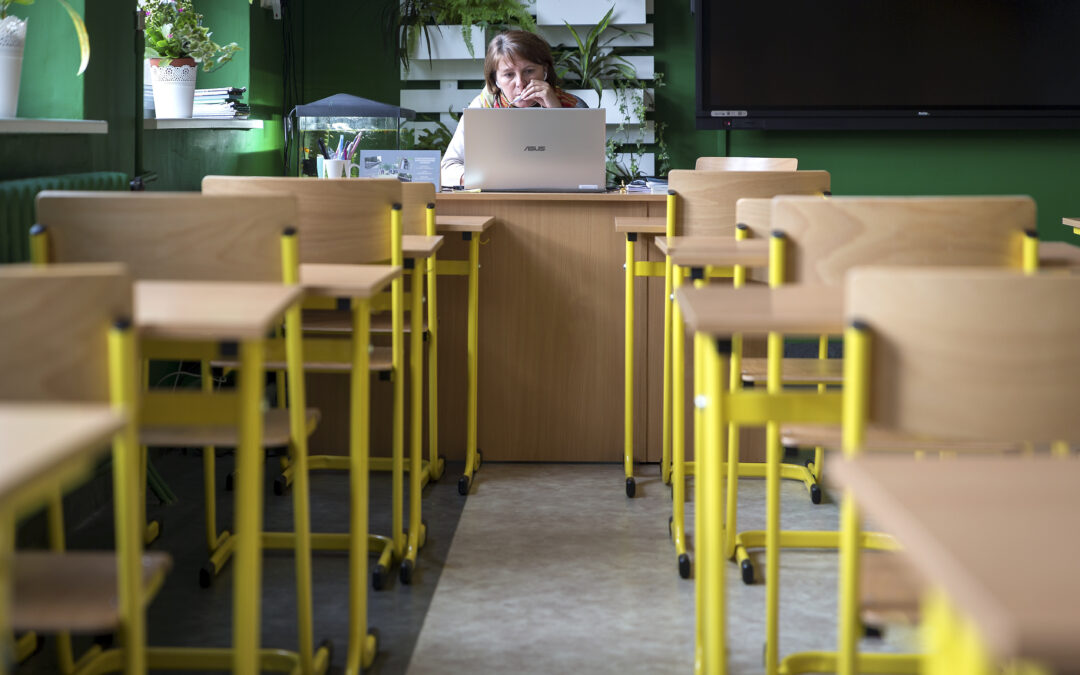The manner in which remote education was implemented during the coronavirus pandemic in Poland lowered the quality of learning, deepened inequalities, and worsened the physical and mental health of both pupils and teachers, according to a report by the state auditor.
The Supreme Audit Office (NIK) criticised the education ministry for failing to provide comprehensive and consistent guidelines to set standards for remote learning, saying that officials relied on “makeshift” solutions instead.
NIK assessed the implementation of remote learning across a sample of school boards, local government units and schools between January 2020 and August 2021. That period saw schools operating remotely for much of the time between March 2020 and early 2021.
The auditors found that some schools dramatically cut the number of lessons, though this varied greatly given the lack of central control. In key subjects like Polish, maths, physics and foreign languages, between 30% and 100% of scheduled classes were held, depending on the school.
Meanwhile, a number of other subjects – including physical education, Catholic catechism and ethics classes – were based on “independent work of pupils”, which in practice meant “shifting the teaching process onto children and their parents”, writes NIK. “Some subjects were not organised at all.”
State TV has faced ridicule for broadcasting error-strewn school lessons for children stuck at home.
An on-screen graphic read: "Lerning English might be great". One teacher mixed up diameter and circumference. Another struggled to explain even numbers https://t.co/RfqxRW7QCV
— Notes from Poland 🇵🇱 (@notesfrompoland) April 5, 2020
NIK also criticised a lack of clear rules or guidelines on monitoring and registering attendance. In two of the eight audited primary schools, teachers did not keep track of attendance at all, while in another it was simply registered as 100% regardless of the actual number of students present.
“There were simply no structural solutions that would provide schools with stable working conditions,” NIK spokesman Łukasz Pawelski told Radio Lublin. He noted that guidelines published by the education ministry were frequently changed and were of a “temporary” or “makeshift” nature.
Between March 2020 and June 2021, the education ministry prepared 58 ordinances on the operation of education institutions and remote learning during the pandemic. Two “key” ordinances were amended 28 times, said the report.
Another issue overlooked by the ministry were technical barriers, such as a lack of stable internet access or suitable equipment, which hampered access to remote education for a number of students. NIK found that these deepened inequalities in access to education.
The auditors noted that the ministry made schools responsible for the provision of remote teaching platforms, and that no system to reduce disruptive behaviour – trolling, disturbances and name-calling – during online lessons was created.
The audit also noted that the ministry commissioned a report on the health impacts of remote learning, which found negative effects on both pupils’ and teachers’ wellbeing.
Yet despite receiving the results in February 2021, the ministry did not announce a support programme until July, which was then implemented at the start of the new school year in September.
In response to a recent surge in infections – leading to Poland’s highest ever case numbers – the government last week ordered all children from the fifth grade upwards to return to remote learning until the end of February.
Previously, schools had stayed open during this academic year, although many had periods of being fully or partially closed – shifting instead to online learning – on an individual basis when coronavirus outbreaks occurred.
Main image: Grzegorz Celejewski / Agencja Gazeta

Agnieszka Wądołowska is deputy editor-in-chief of Notes from Poland. She is a member of the European Press Prize’s preparatory committee. She was 2022 Fellow at the Entrepreneurial Journalism Creators Program at City University of New York. In 2024, she graduated from the Advanced Leadership Programme for Top Talents at the Center for Leadership. She has previously contributed to Gazeta Wyborcza, Wysokie Obcasy and Duży Format.




















